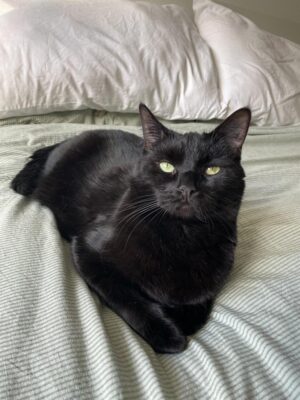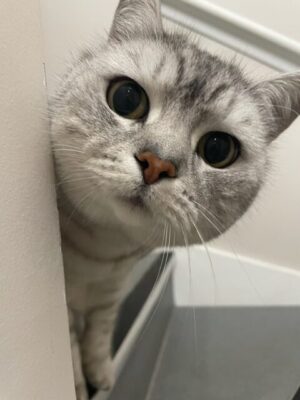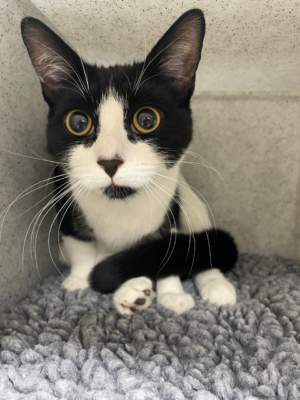My cat is Hyperthyroid – what does this mean?
Hyperthyroidism (an excessive level of thyroid hormone) is caused by an overactive thyroid gland. The thyroid glands are located either side of the windpipe under the neck. One gland or both glands can be overactive.
The overactive gland produces too much thyroid hormone which causes your cat’s metabolism to increase putting a lot of pressure on the heart and other organs. It is like running an ultramarathon everyday! It can make your pet very ill the longer this is left untreated. In the majority of cases this is a benign enlargement of the gland, but in a small percentage (1-2%) of cases the thyroid gland enlargement can be cancerous.
Hyperthyroidism is a disease generally seen in older cats >10 years of age. The most common clinical signs we see include weight loss and an increased appetite. Many cats will also experience some vomiting or diarrhoea. Secondary heart failure, kidney issue and high blood pressure can also result from an untreated hyperthyroid state.
Diagnosis is made from a blood sample, and we may recommend your cat have a urine sample and a blood pressure check too.
There are several treatment options for hyperthyroid cats.
- Y/d diet – For the body to make thyroid hormone, it requires iodine in the diet. Y/d is a diet specifically low in iodine which can help reduce the thyroid hormone release. If using this diet as a treatment, you unfortunately cannot feed your cat anything else , therefore if your cat is a hunter or likes occasional treats this is not an option. We recommend regular monitoring (initially every month then every 3-6 months) to check the diet is controlling the thyroid as necessary. This is the least effective option and often cats need to revert to one of the following options. It can take up to 12 weeks until your cat’s thyroid level is controlled.
- Medical treatment – this aims to reduce the production of thyroid hormone. It is usually given on a daily basis for the lifetime of the animal. It can come in tablet or liquid formulations to take orally, or a cream formulation to apply to the ear if your cat is difficult to medicate. The dose of medication often needs to be adjusted to find the ideal level for your cat as it often varies for each individual. Tablets can have some side effects that are usually transient but on occasion do not agree with a pet and the medication may need to be changed. Regular monitoring with blood tests is necessary initially every 3-4 weeks until control is established and then every 3-6 months. Once stabilised, the annual cost for medication and monitoring would include daily tablets, two thyroid blood tests 6 months apart and a prescription vet check appointment. Please get in touch if you would like an estimate for this
- Surgical removal of the thyroid glands – Often it is very obvious which gland is enlarged, and this can safely be removed surgically. Should both glands be enlarged, we often recommend staging the surgeries: removing both at one time can lead to low calcium levels, so it is safer to stage the surgeries. It is possible that the second gland may become overactive at a later date, at which point we recommend removal of this, Surgery can be a more expensive upfront cost, but can often end up being more cost effective compared to life-time medication. Please get in touch if you would like an estimate for surgery. We recommend stabilising your cat’s thyroid level with medical management for the few weeks prior to surgery.
- Radioactive iodine treatment – This is the gold standard treatment and performed at specialist centres in various parts of the UK. Blood tests and urine tests are required prior to this referral to ensure your pet is otherwise healthy, and some referral centres ask that your cat has been on thyroid treatment for a few weeks prior to having the radioactive iodine. Your cat will be assessed and if considered a good candidate, will be injected with radioactive iodine, which selectively destroys the thyroid gland. A single injection of radioactive iodine is curative in about 95% of hyperthyroid cats. Your will need to stay in the specialist centre for a few days whilst receiving the treatment as they will for a short term be radioactive. You will then need to ensure your cat can’t go outside for a week post treatment and you will need to dispose of litter in a special way. This again can be a more expensive option up front but has an excellent cure rate and may overall be more cost effective compared to long-term medical management.
The two closest places which are both about an hour from Wokingham are:
Anderson Moores near Winchester
The Queen Mother Hospital for Small Animals in Potters Bar in Hertfordshire










